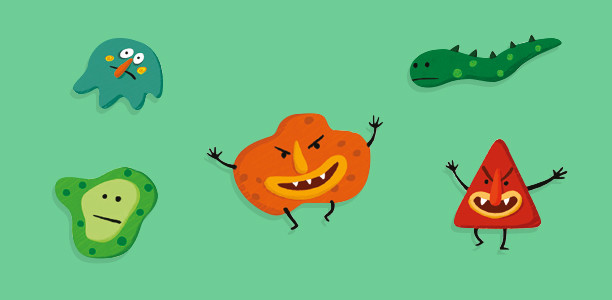Learn about the importance of washing our hands and do an experiment to show how germs spread
Germ Outbreak
Learn about the importance of washing our hands and do an experiment to show how germs spread from your hands

Learn about why hand washing is important
- HWB 0-15a - I am developing my understanding of the human body and can use this knowledge to maintain and improve my wellbeing and health.
- HWB 0-16a
- HWB 1-15a - I am developing my understanding of the human body and can use this knowledge to maintain and improve my wellbeing and health.
- HWB 1-16a
- HWB 1-33a - I am becoming aware of how cleanliness, hygiene and safety can affect health and wellbeing and I apply this knowledge in my everyday routines such as taking care of my teeth.
- we're learning the importance of washing hands correctly
- we're learning how easily different germs can spread
- I can explain and show when to wash hands and how different germs can spread
Resources
- chalk/glitter/paint
- 3 x slices of bread and sealable bags
- paper for posters
- watch our video about handwashing
Effective handwashing
Activities
Warm up and introduction
Discuss:
- why do we need to wash our hands?
- how do germs spread around the school/house – use chalk experiment to show
Chalk experiment
- each pupil should have chalk/glitter/paint on their hands (different colours represent a different germ that has been touched)
- pupils are then allowed 5 minutes to play or go about their usual routine in the classroom before everyone gathers back together to discuss the results
Discussion of results of warm up
- discuss what has happened to the chalk and how can we relate that to germs.
Bread experiment
Introduce and then explain the bread experiment:
- 3 slices of bread put into sealable bags:
- 1 x control (untouched)
- 1 x passed around class (pupils unwashed hands)
- 1 x touched by pupils after washing their hands
- label each bag
- place in a cupboard and leave for 1 week
- discuss what pupils expect to happen to the 3 slices of bread
- revisit bread after one week and discuss what they thought would happen compared to what has happened
One week later:
- focus on difference between pieces of bread and how different foods can be affected when hands are not washed correctly and how germs can be spread by unclean hands
Assessment opportunities
SAY – I can explain and show how and when to wash hands and how different germs can spread.
Consider CfE Benchmarks, for example:
- explains the important of daily hygiene routines, for example, hand washing, teeth brushing and body cleanliness
Cross-Curricular links
Science – change in bread
Literacy – listening and talking
Functional writing – writing facts of outbreak / poster design
Art – poster design
ICT – iPad / iMovie
